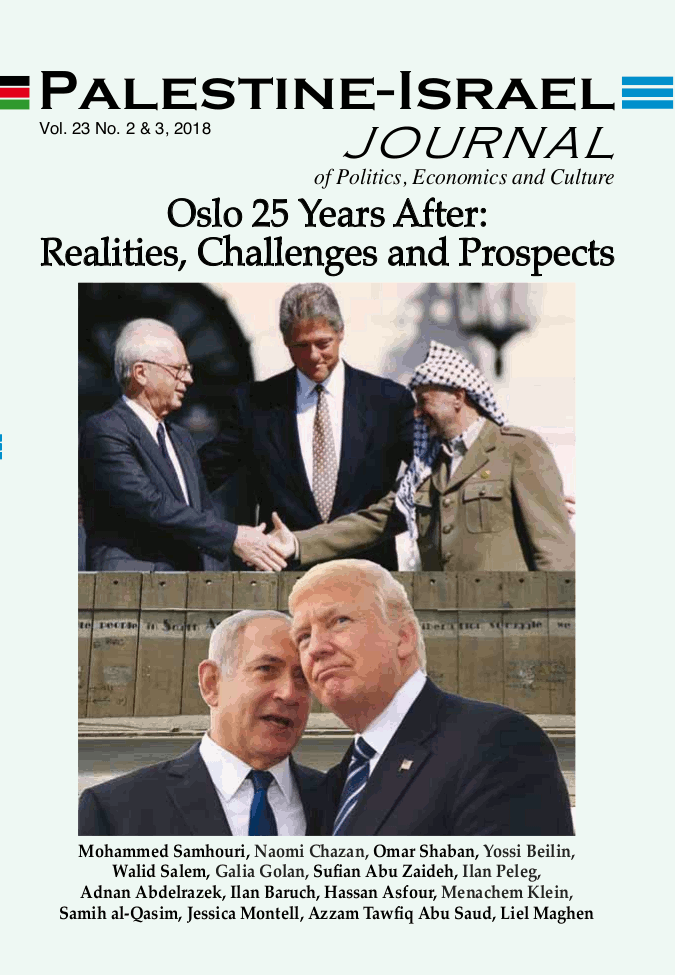Usually our opinions regarding any political event is connected to our previous knowledge and political involvement and is shaped by what we see, read, hear and watch on TV. However, as a 33-year-old housewife with only a high school education living in Amman, Jordan, at the time of the Oslo Accords in 1993, I understood that we had given up on our Historical Palestine by recognizing the state of Israel in exchange for a Palestinian mini-state in only the West Bank and Gaza, with East Jerusalem as its capital, while the important issues such as the right of return, borders and Jerusalem, among others, would be postponed to a later stage of negotiations.
At the same time, I found out that people who were against the agreement were talking about a leaked document that spoke differently about the future of this agreement. This cast doubt on the possibility of creating an independent state, focusing instead on images of a dark future which included Palestinians living in West Bank cantons separated from one another with only cosmetic changes to the occupation.
As the daughter of a refugee whose aspiration and mine was, and still is, to go back to our hometown near Jaffa one day, I was not very enthusiastic about the Oslo agreement.
Since I did not take the leaked document seriously, my feelings were “meh,” as expressed in Facebook terms. My feelings took different turns throughout the course of the Oslo process and the challenges of my personal life.
During the first three years, I was busy reorganizing my own family life. In 1996, I left Amman and moved back to al-Eizariya (Bethany), an East Jerusalem suburb, surviving the consequences of breaking the bonds of 18 years of marriage and working hard to build others. Hence, I unconsciously took the decision to leave politics to politicians, telling myself that what would happen to all Palestinians would happen to me by default and that my political engagement would not have any impact other than to hold me back from achieving my personal goals.
During that period, I witnessed the failure of the implementation of what was called at that time “the peace process” that should have led to a Palestinian state by the end of 1999, the second intifada of 2000, the closure process, the construction of the Separation Wall, whose cracks I squeezed through in its first stages, and the erection of the checkpoint I passed through on my way to work in Jerusalem when the cracks in the wall were completely sealed off.
However, I acted as if this were not happening to me but to somebody else; I was in denial. This continued until 2010, when I was almost done with my personal struggle. I pursued higher education and had my own apartment, a car and a good position at Al-Quds University. Most importantly, my son and daughter had obtained their university degrees as well and were working, and later my daughter got married and left with her husband to work in the United Arab Emirates, and my son began living independently in Ramallah.
Therefore, I was looking for something to keep me busy, and the chance came when I won a scholarship and moved to Italy to pursue a doctorate. It was only then and because of my PhD research on the impact of the Separation Wall on Palestinian social capital that I started to undergo a retroactive process of “understanding” the whole issue, especially the details of the Oslo Accords, with an open mind and wounded heart.
I studied East Jerusalem and al-Eizariya, where I used to live, and found that the Palestinians of East Jerusalem, whether they live in the city or in its West Bank suburbs, had reorganized their lives around the high taxation, the settlements, the wall, and the continuous process of Judaization of the city. They coexist with all these hardships, while the vast majority of the population of the suburbs, who are denied access to Israel and East Jerusalem because they are located in the West Bank, slowly accepted the fact that East Jerusalem is no longer the center of their social and economic activities and organized their lives accordingly. As a result, they have normalized the existence of the wall, the checkpoints, the surrounding settlements and the long bypass roads and look at them as part of the general landscape into which they blend, making them invisible. I was not the only one living in denial. Most of the people were surviving rather than living, and a few of them who did not accept what was going on and felt they should do something about it were either killed or imprisoned by Israel.
I think that the mutual recognition between Israel and the Palestinian Liberation Organization (PLO) was a golden opportunity for Israel to achieve peace and end this historical conflict with the Palestinian people, but it missed this opportunity. However, this was only the first step. Instead of reaching an agreement according to the timetable set by the Oslo Accords, negotiations became an endless process that led to dead ends because of Israel’s intransigence and procrastination.
Now, 25 years after the Oslo Accords, I feel angry not only because this agreement failed to fulfill the aspirations of the Palestinian people but also because Israel has used the time since Oslo to confiscate more land to expand existing settlements and to build new ones. In my view and in those of many other Palestinians, Israel deliberately postponed the negotiations regarding East Jerusalem to gain time and change the demographics and character of the city in order to make it difficult to withdraw later in the event of a political solution. The Oslo Accords, in my humble opinion, were a huge mistake, and I now believe that the plan was to reach this point from the outset, as said in the leaked document from1993, because it corresponds to the facts on the ground.

